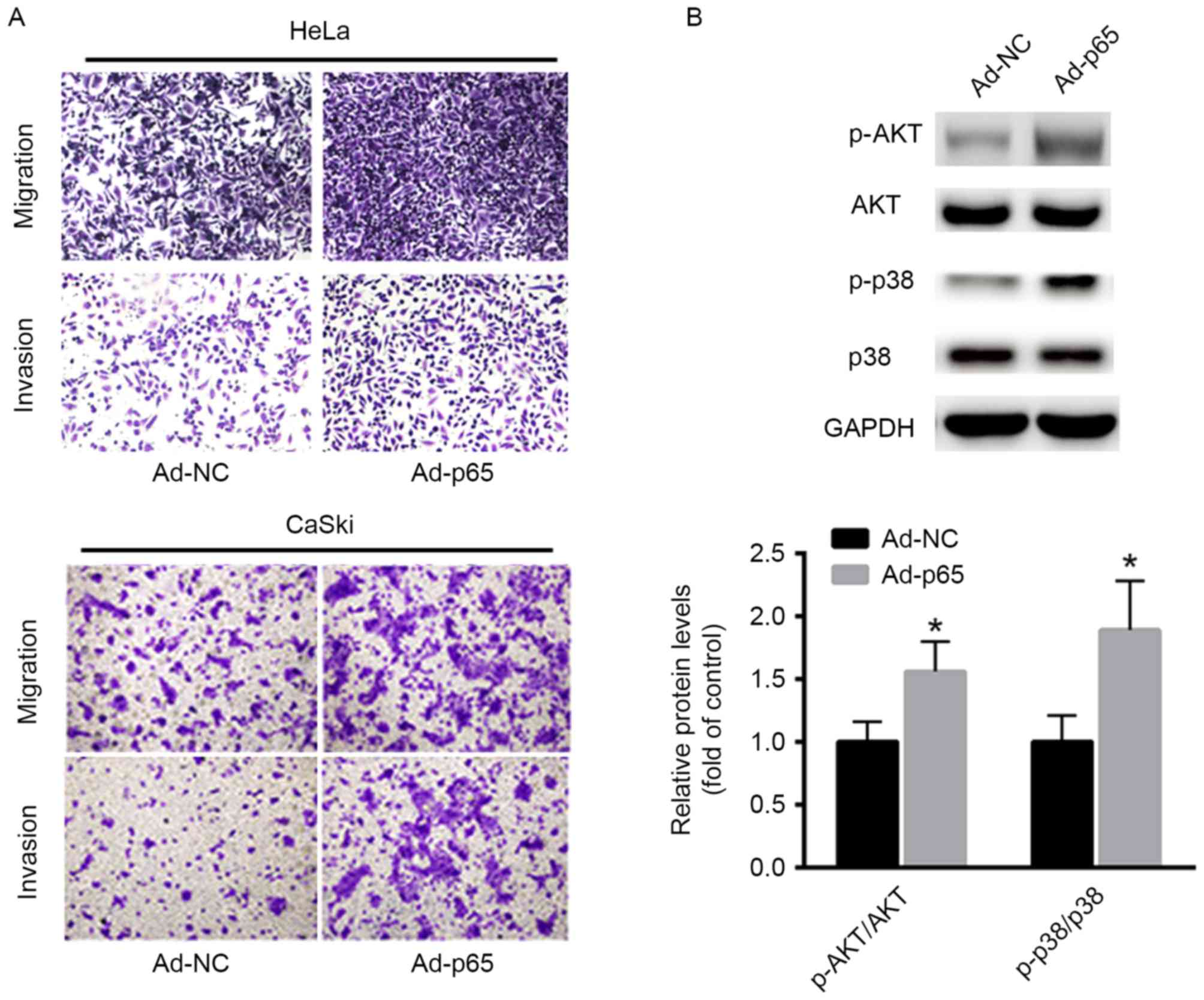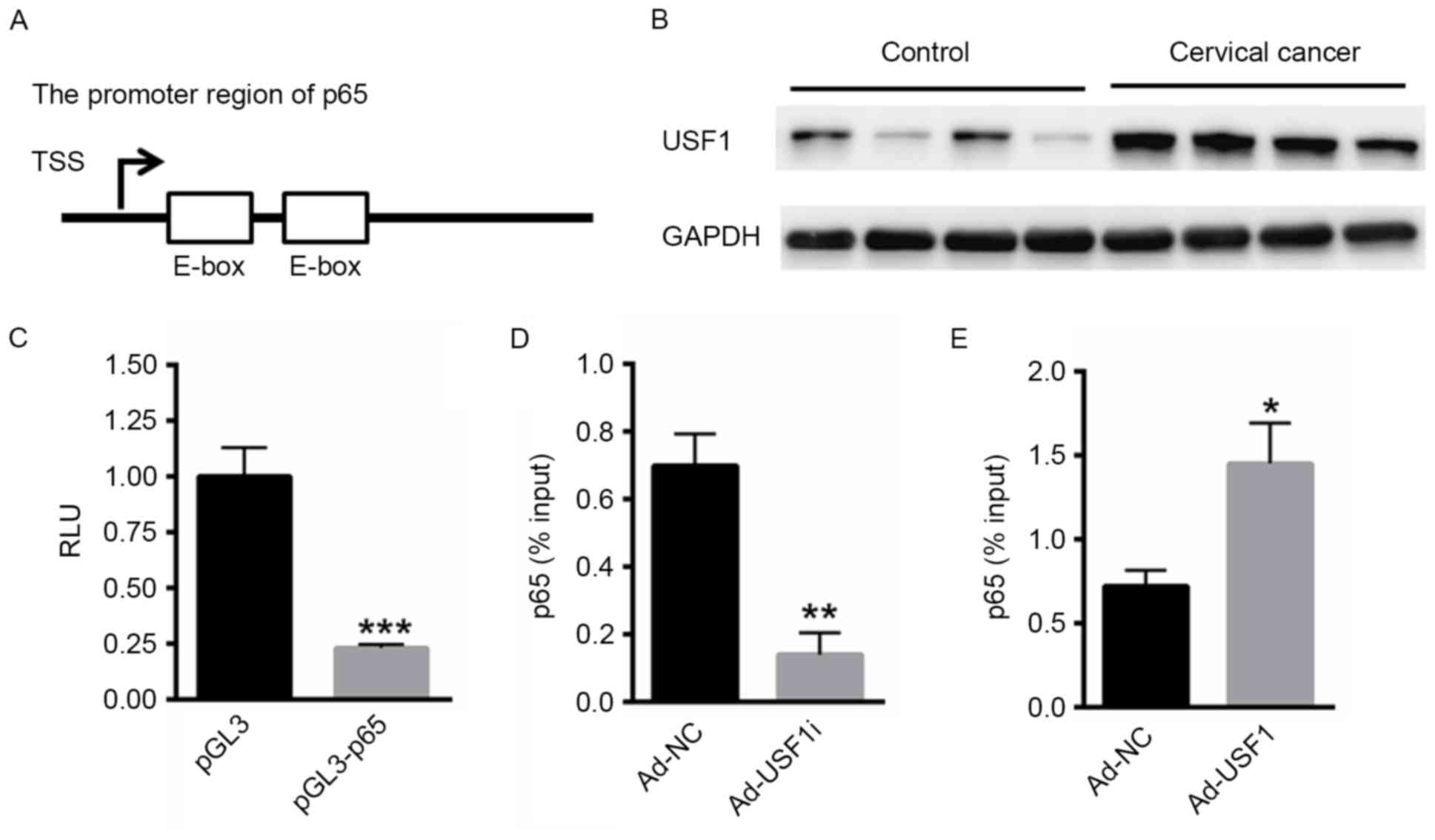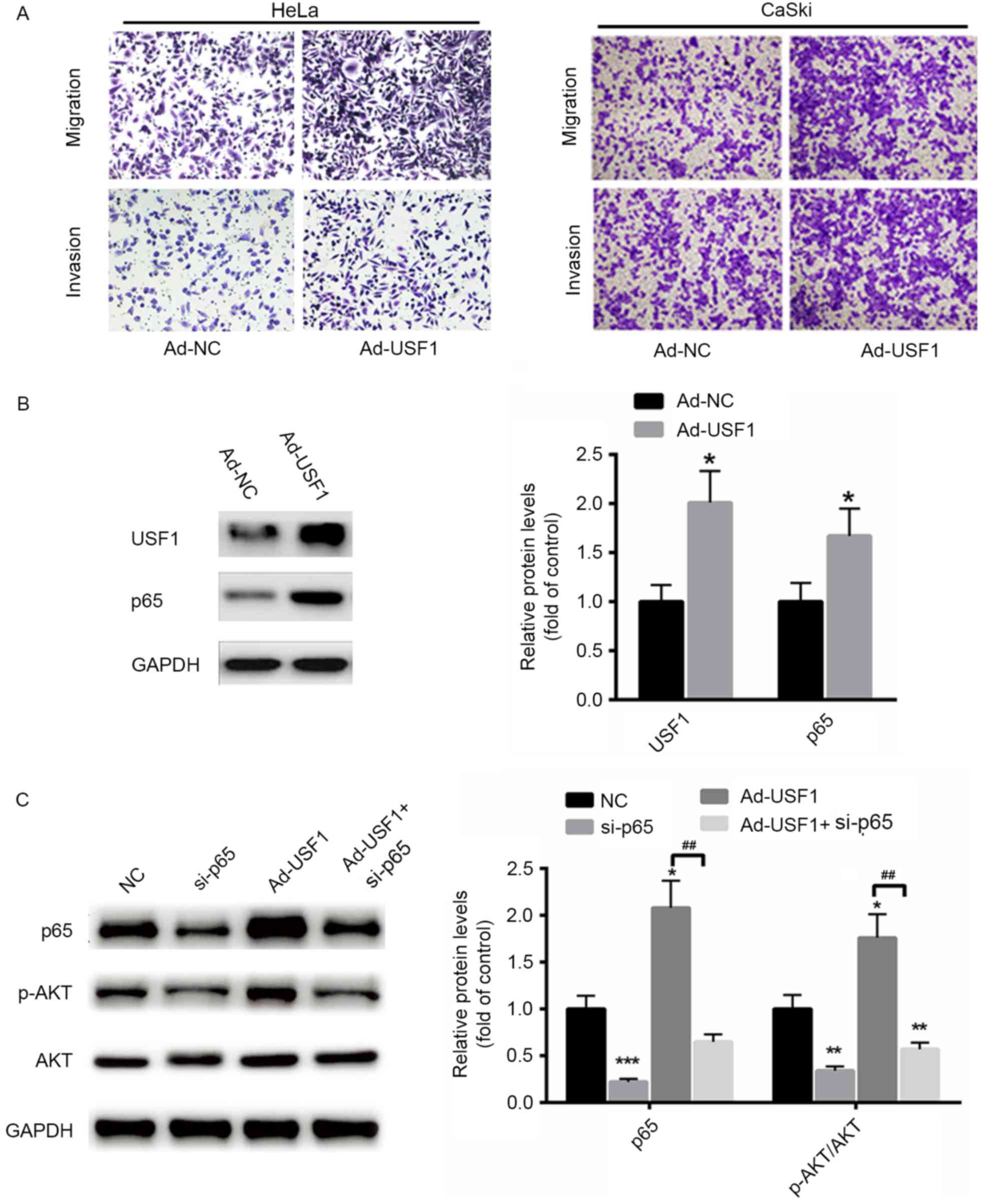|
1
|
Forouzanfar MH, Foreman KJ, Delossantos
AM, Lozano R, Lopez AD, Murray CJ and Naghavi M: Breast and
cervical cancer in 187 countries between 1980 and 2010: A
systematic analysis. Lancet. 378:1461–1484. 2011. View Article : Google Scholar : PubMed/NCBI
|
|
2
|
Bian ML, Cheng JY, Ma L, Cong X, Liu J,
Chen Y and Chen X: Evaluation of the detection of 14 high-risk
human papillomaviruses with HPV 16 and HPV 18 genotyping for
cervical cancer screening. Exp Ther Med. 6:1332–1336. 2013.
View Article : Google Scholar : PubMed/NCBI
|
|
3
|
Chao A, Lin CT and Lai CH: Updates in
systemic treatment for metastatic cervical cancer. Curr Treat
Options Oncol. 15:1–13. 2014. View Article : Google Scholar : PubMed/NCBI
|
|
4
|
Lu X, Wu L, Liu Z, Xie L and Wang S:
Peripheral blood mononuclear cells inhibit proliferation and
promote apoptosis of HeLa cells following stimulation with Bacillus
Calmette-Guerin. Exp Ther Med. 5:561–566. 2013. View Article : Google Scholar : PubMed/NCBI
|
|
5
|
Nartthanarung A, Thanapprapasr K,
Udomsubpayakul U and Thanapprapasr D: Age and survival of cervical
cancer patients with bone metastasis. Asian Pac J Cancer Prev.
15:8401–8404. 2014. View Article : Google Scholar : PubMed/NCBI
|
|
6
|
Thanapprapasr D, Nartthanarung A,
Likittanasombut P, Ayudhya Na NI, Charakorn C, Udomsubpayakul U,
Subhadarbandhu T and Wilailak S: Bone metastasis in cervical cancer
patients over a 10-year period. Int J Gynecol Cancer. 20:373–378.
2010. View Article : Google Scholar : PubMed/NCBI
|
|
7
|
Hyldahl RD, Schwartz LM and Clarkson PM:
NF-KB activity functions in primary pericytes in a cell- and
non-cell-autonomous manner to affect myotube formation. Muscle
Nerve. 47:522–531. 2013. View Article : Google Scholar : PubMed/NCBI
|
|
8
|
Limpert AS, Bai S, Narayan M, Wu J, Yoon
SO, Carter BD and Lu QR: NF-kB forms a complex with the chromatin
remodeler BRG1 to regulate Schwann cell differentiation. J
Neurosci. 33:2388–2397. 2013. View Article : Google Scholar : PubMed/NCBI
|
|
9
|
Zhou R, Hu G, Gong AY and Chen XM: Binding
of NF-kappaB p65 subunit to the promoter elements is involved in
LPS-induced transactivation of miRNA genes in human biliary
epithelial cells. Nucleic Acids Res. 38:3222–3232. 2010. View Article : Google Scholar : PubMed/NCBI
|
|
10
|
Pfeffer LM: The role of nuclear factor
kappaB in the interferon response. J Interferon Cytokine Res.
31:553–559. 2011. View Article : Google Scholar : PubMed/NCBI
|
|
11
|
Karin M, Cao Y, Greten FR and Li ZW:
NF-kappaB in cancer: From innocent bystander to major culprit. Nat
Rev Cancer. 2:301–310. 2002. View
Article : Google Scholar : PubMed/NCBI
|
|
12
|
Wang CY, Cusack JC Jr, Liu R and Baldwin
AS Jr: Control of inducible chemoresistance: Enhanced anti-tumor
therapy through increased apoptosis by inhibition of NF-kappaB. Nat
Med. 5:412–417. 1999. View
Article : Google Scholar : PubMed/NCBI
|
|
13
|
He A, Ji R, Shao J, He C, Jin M and Xu Y:
TLR4-MyD88-TRAF6-TAK1 Complex-Mediated NF-kB Activation Contribute
to the Anti-inflammatory effect of V8 in LPS-induced human cervical
cancer SiHa cells. Inflammation. 39:172–181. 2016. View Article : Google Scholar : PubMed/NCBI
|
|
14
|
Ma XF, Zhang J, Shuai HL, Guan BZ, Luo X
and Yan RL: IKKβ/NF-κB mediated the low doses of bisphenol A
induced migration of cervical cancer cells. Arch Biochem Biophys.
573:52–58. 2015. View Article : Google Scholar : PubMed/NCBI
|
|
15
|
Pajukanta P, Lilja HE, Sinsheimer JS,
Cantor RM, Lusis AJ, Gentile M, Duan XJ, Soro-Paavonen A,
Naukkarinen J, Saarela J, et al: Familial combined hyperlipidemia
is associated with upstream transcription factor 1 (USF1). Nat
Genet. 36:371–376. 2004. View
Article : Google Scholar : PubMed/NCBI
|
|
16
|
Plaisier CL, Horvath S, Huertas-Vazquez A,
Cruz-Bautista I, Herrera MF, Tusie-Luna T, Aguilar-Salinas C and
Pajukanta P: A systems genetics approach implicates USF1, FADS3,
and other causal candidate genes for familial combined
hyperlipidemia. PLoS Genet. 5:e10006422009. View Article : Google Scholar : PubMed/NCBI
|
|
17
|
Meex SJ, van Vliet-Ostaptchouk JV, van der
Kallen CJ, van Greevenbroek MM, Schalkwijk CG, Feskens EJ, Blaak
EE, Wijmenga C, Hofker MH, Stehouwer CD and de Bruin TW: Upstream
transcription factor 1 (USF1) in risk of type 2 diabetes:
Association study in 2000 Dutch caucasians. Mol Genet Metab.
94:352–355. 2008. View Article : Google Scholar : PubMed/NCBI
|
|
18
|
Benedet JL, Bender H, Jones H III, Ngan HY
and Pecorelli S: FIGO staging classifications and clinical practice
guidelines in the management of gynecologic cancers. FIGO Committee
on Gynecologic Oncology. Int J Gynaecol Obstet. 70:209–262. 2000.
View Article : Google Scholar : PubMed/NCBI
|
|
19
|
Coulson JM, Edgson JL, Marshall-Jones ZV,
Mulgrew R, Quinn JP and Woll PJ: Upstream stimulatory factor
activates the vasopressin promoter via multiple motifs, including a
non-canonical E-box. Biochem J. 369:549–561. 2003. View Article : Google Scholar : PubMed/NCBI
|
|
20
|
Chen B, Hsu R, Li Z, Kogut PC, Du Q,
Rouser K, Camoretti-Mercado B and Solway J: Upstream stimulatory
factor 1 activates GATA5 expression through an E-box motif. Biochem
J. 446:89–98. 2012. View Article : Google Scholar : PubMed/NCBI
|
|
21
|
Pahne-Zeppenfeld J, Schroer N,
Walch-Ruckheim B, Oldak M, Gorter A, Hegde S and Smola S: Cervical
cancer cell-derived interleukin-6 impairs CCR7-dependent migration
of MMP-9-expressing dendritic cells. Int J Cancer. 134:2061–2073.
2014. View Article : Google Scholar : PubMed/NCBI
|
|
22
|
Sun S, Tang L, Zhang J, Lv F, Wang Z, Wang
L, Zhang Q, Zheng C, Qiu L, Jia Z, et al: Cisplatin improves
antitumor activity of weekly nab-paclitaxel in patients with
metastatic breast cancer. Int J Nanomedicine. 9:1443–1452.
2014.PubMed/NCBI
|
|
23
|
Xu L, Liu JH, Zhang J and Wang ZH:
Blockade of autophagy aggravates endoplasmic reticulum stress and
improves Paclitaxel cytotoxicity in human cervical cancer cells.
Cancer Res Treat. 47:313–321. 2015. View Article : Google Scholar : PubMed/NCBI
|
|
24
|
Baldwin AS: Control of oncogenesis and
cancer therapy resistance by the transcription factor NF-kappaB. J
Clin Invest. 107:241–246. 2001. View
Article : Google Scholar : PubMed/NCBI
|
|
25
|
Li J, Jia H, Xie L, Wang X, Wang X, He H,
Lin Y and Hu L: Association of constitutive nuclear factor-kappaB
activation with aggressive aspects and poor prognosis in cervical
cancer. Int J Gynecol Cancer. 19:1421–1426. 2009. View Article : Google Scholar : PubMed/NCBI
|
|
26
|
Chou RH, Hsieh SC, Yu YL, Huang MH, Huang
YC and Hsieh YH: Fisetin inhibits migration and invasion of human
cervical cancer cells by down-regulating urokinase plasminogen
activator expression through suppressing the p38 MAPK-dependent
NF-κB signaling pathway. PLoS One. 8:e719832013. View Article : Google Scholar : PubMed/NCBI
|
|
27
|
Park BK, Zhang H, Zeng Q, Dai J, Keller
ET, Giordano T, Gu K, Shah V, Pei L, Zarbo RJ, et al: NF-kappaB in
breast cancer cells promotes osteolytic bone metastasis by inducing
osteoclastogenesis via GM-CSF. Nat Med. 13:62–69. 2007. View Article : Google Scholar : PubMed/NCBI
|
|
28
|
Rhode J, Fogoros S, Zick S, Wahl H,
Griffith KA, Huang J and Liu JR: Ginger inhibits cell growth and
modulates angiogenic factors in ovarian cancer cells. BMC
Complement Altern Med. 7:442007. View Article : Google Scholar : PubMed/NCBI
|
|
29
|
Zong H, Wang F, Fan QX and Wang LX:
Curcumin inhibits metastatic progression of breast cancer cell
through suppression of urokinase-type plasminogen activator by
NF-kappa B signaling pathways. Mol Biol Rep. 39:4803–4808. 2012.
View Article : Google Scholar : PubMed/NCBI
|
|
30
|
Sahu BD, Kumar JM and Sistla R: Fisetin, a
dietary flavonoid, ameliorates experimental colitis in mice:
Relevance of NF-κB signaling. J Nutr Biochem. 28:171–182. 2016.
View Article : Google Scholar : PubMed/NCBI
|
|
31
|
Yuan Q, Bu Q, Li G, Zhang J, Cui T, Zhu R
and Mu D: Association between single nucleotide polymorphisms of
upstream transcription factor 1 (USF1) and susceptibility to
papillary thyroid cancer. Clin Endocrinol (Oxf). 84:564–570. 2016.
View Article : Google Scholar : PubMed/NCBI
|
|
32
|
Landa I, Ruiz-Llorente S, Montero-Conde C,
Inglada-Pérez L, Schiavi F, Leskelä S, Pita G, Milne R, Maravall J,
Ramos I, et al: The variant rs1867277 in FOXE1 gene confers thyroid
cancer susceptibility through the recruitment of USF1/USF2
transcription factors. PLoS Genet. 5:e10006372009. View Article : Google Scholar : PubMed/NCBI
|


















